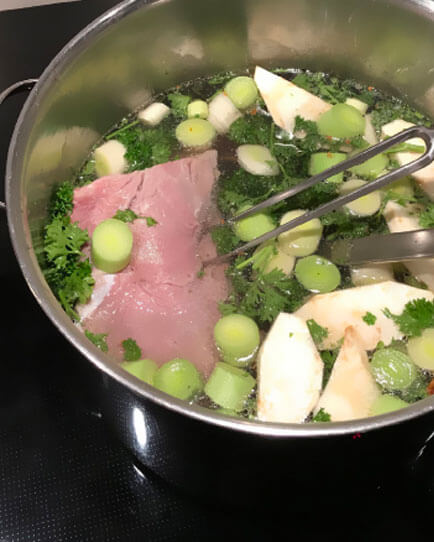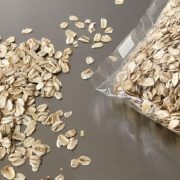Is clearly cheaper,
however not suitable for vegetarians
New York Fashion Week regularly features non
served only champagne, cocktails and cold-pressed vegetable juices:
The bone broth, which is served there in hip glasses, finds favor with
the visitors lively sales.
Broths, based on bones of beef or chicken, but also carcasses of seafood are not an option for vegetarians. For everyone else, they could be an interesting and in any case much cheaper option than sinfully expensive anti-aging creams.
New York cosmetologist Julia March recommends bone broths to all her clients and explains the positive effects for the skin as follows: “The proteins and amino acids of bone broths can be easily absorbed by the body and are the cornerstones of building body tissues. They help the body to repair attacked or destroyed body tissues and thus reduce inflammation of the skin.
Hyaluronic acid and collagen, which are absorbed by the body with the bone broths, promote the inflow of water in the cells of the skin and make the skin look plumper. Another positive side effect: the broths reduce the desire for sweets. And sugar, which attacks the skin’s collagen and elastic fibers, among many negative health effects, contributes to premature aging of the skin.”
Unfortunately, there are no sufficient medical studies for these theses. Only for chicken broth there are smaller, but thus not representative studies. This is not surprising, since the financial resources required for a correspondingly large-scale study are usually invested in research into drugs or therapeutic approaches, behind which there is a corresponding financial return-on-investment.
Nevertheless, there are at least three good reasons to cook your own broth, even if there are unfortunately no medical studies on this yet that clearly prove that bone broth, has the same effect as the package inserts of numerous anti-aging creams promise, if you believe in it:
Taste
Every top chef always has at least one, but usually several broths boiling at the same time in his kitchen. A good broth is the basis of a perfect sauce, a wonderful risotto and any soup.
Respect
“From noose to tail” was the principle Fergus Henderson and Trevor Gulliver used to open their (excellent) St. John restaurant on St. John Street in London in 1994. There, from the beginning, almost all parts of an animal were processed in the kitchen.
Meanwhile, the idea has gained more followers that many other parts of the animal besides the tenderloin taste great, and that processing a wide variety of parts of an animal is also a form of respect for the animal.
Ingredients
Cooking broth consists of bones, carcasses, celery, onions, celery, salt, pepper, juniper and bay leaf. If you want, some more wine. You thus determine exactly what is contained in your broth and are thus sure that no flavorings, glutamate, colorants, etc. can be found in it.
For GloriousMe, these three reasons alone are enough to make their own broth very often on the weekend. Just give it a try, especially since any broth is also ideal for freezing.
The basic recipe for bone broth
Turn the oven to the highest setting and roast the bones in a roasting pan for about 15 minutes. There is usually enough fat on the bones that they can be placed directly into the roaster. After 15 minutes, turn, roast for another 10 minutes and then add half a celery bulb, cut into large pieces.
About five minutes before the end of the roasting time, put halved onions (with peel) with the cut side in a pot and roast there, also without fat.
Add the bones at the end of the roasting time and fill the pot with water and a little white wine until the bones, halved onions and celery pieces are covered.
Season with plenty of salt and pepper. Add 4 juniper berries and 2 bay leaves, then simmer gently for four to five hours.
Roasting the bones and onion skins produces a broth that is nice and clear with a golden brown color. After the boiling time, pass the broth through a pointed sieve. Done.




